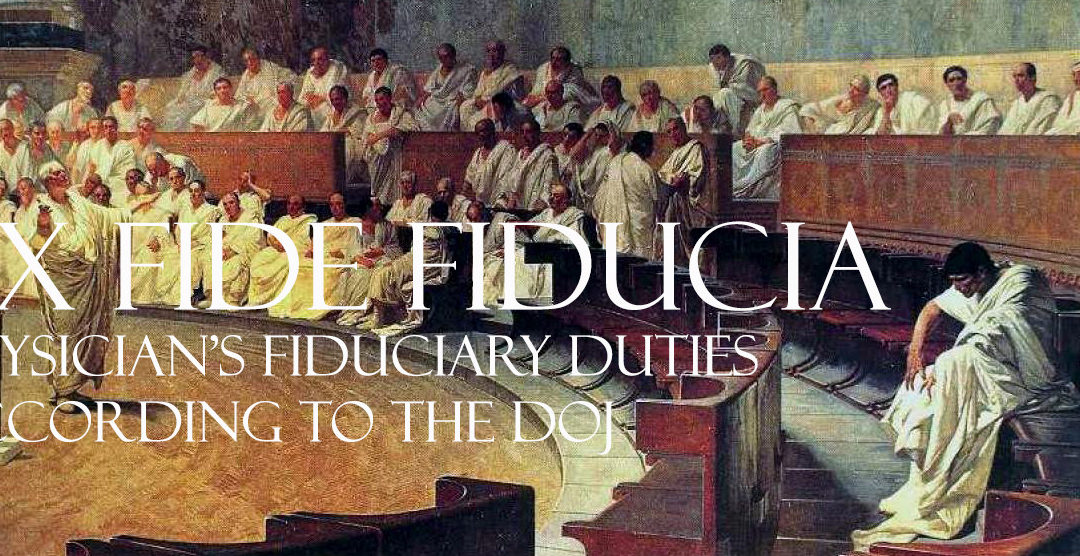Following through on its commitment to increase healthcare fraud and abuse enforcement against individuals, on December 6th, 2016, the U.S. Department of Justice indicted six pharmaceutical executives on charges of conspiracy, racketeering, mail fraud, wire fraud and violation of the Anti-Kickback Statute.[1] The six individuals held positions of great responsibility (including the former CEO) at Insys Therapeutics. Insys is a specialty pharmaceutical company that markets a fentanyl sublingual spray called Subsys® with a very narrow indication: management of breakthrough pain in patients with cancer, 18 years of age or older, who were already receiving and who were already tolerant to opioid therapy for their underlying persistent cancer pain.
According to the DOJ, the six indicted individuals allegedly engaged in a pattern of bribing doctors through different schemes including fake speaker programs, employing friends or family of key prescribers, and providing them with free administrative support to conduct benefit investigations and obtain prior authorization from insurers. Additionally, the indictment alleges that these executives engaged in off-label promotion by engaging doctors with practices outside of the approved scope of use to act as speakers.
The indictment is worth a read for any healthcare compliance person. In fact, it is even worth a read by people in sales and marketing as it provides a fresh and interesting insight on the nation’s top healthcare compliance enforcer mindset. That been said, today I just want to focus on a seemingly unimportant but fascinating phrase in page 4 of the indictment:
“[medical practitioners]… owed a fiduciary duty to their patients to refrain from accepting or agreeing to accept bribes and kickbacks in exchange for prescribing any drug.”
If you are not an attorney, this language will likely not raise any eyebrows and you won’t spend a second thinking about its significance, but for attorneys (at least for me) it raises interesting issues. You see, the DOJ purposefully used the words “fiduciary duty” [2], which is a legal term-of-art, and that has consequences… Let me try to explain.
Duty can generally be defined as an obligation to behave in a certain manner. Some duties are moral while others can be considered “legal” and what we mean by “legal” is that they can be enforced against the person that breached them. Simply put, if you breach a legal duty there will be tangible consequences (i.e. damages). Legal duties can arise out of contract, out of law, or out of the special relationship between the parties. Fiduciary duties arise out of the latter, that is, out of the special relationship between the parties. [3] In fact, there is no higher standard of care than a fiduciary duty. So, the question becomes: is a physician-patient relationship a fiduciary relationship and, if so, what is its scope?
From a strictly medical perspective, it is without doubt that a fiduciary relationship exists between physicians and patients.[4] When a patient goes to see a doctor he is clearly relying on the latter’s medical expertise and training and, thus, putting his health in the doctor’s hands.[5] Whether that fiduciary nature can be extended beyond medical matters, however, is not so clear… For instance, do you conduct a moral character or reputational due diligence before choosing a new primary care physician? Would the results of that exercise affect your decision to select a particular doctor (assuming of course he was medically competent)? Imagine, God forbid, that you are rushing a sick child to a hospital emergency room. Would you yell: “I need an ethical doctor with no history of taking bribes from big pharma or medical device companies to save my dying child and I won’t accept one otherwise”? …. Viewed from this standpoint would it be fair to conclude that practitioners owe a fiduciary duty to their patients to refrain from accepting or agreeing to accept bribes and kickbacks in exchange for prescribing a drug that is nevertheless effective to treat the patient’s ailment?[6]
While some scholars and case law have argued for some extension of a physician’s fiduciary duty with respect to cost containment initiatives, their analysis has always relied on the duty to ensure proper quality care to the patient rather than on guaranteeing the lowest possible cost.[7] [8] Therefore, absent a specific legal provision or contractual undertaking, it would seem uphill to argue that physicians owe their patients an independent fiduciary duty to abstain from taking bribes in exchange for prescribing drugs or to otherwise guarantee proper care at the lowest possible cost.
Even if we were to conclude that such a fiduciary duty existed, we should also analyze the consequences of a breach of said duty. As discussed, one of the characteristics of fiduciary duties is that their breach has legal consequences.[9] If a fiduciary duty existed in the way described by the DOJ, then patients would have the right to individually sue physicians that take bribes. If that was the case, what would be the measure of their damages? One likely measure could be the pro-rata increase in healthcare costs that are directly attributable to the doctor taking the bribe. For instance, if a doctor takes a bribe to prescribe the branded product instead of the cheaper generic, he is adding to the increase in overall healthcare costs which, indirectly, would affect the patient’s out-of-pocket expense. Imagine quantifying that… But let’s not stop there, what if the doctor took the bribe to switch the patient from one product to another which costs exactly the same and which is equally effective. How would the patient calculate damages? Not easy…
While the increase in corruption-related litigation by private parties over the past couple of years (and the novel theories in which they have relied)[10], is indeed an interesting development, in the absence of specific legislation, contractual provision or a clear judicial precedent, it appears difficult to support that patients would have an independent cause of action for breach of fiduciary duty against corrupt doctors who have not committed medical malpractice. That being said, these are strange times and sometimes you just need to have some faith… As the Latin motto says, Ex Fide Fiducia, or more appropriately in our case, Ex Fide Fiducialem Officium.
[1] The full indictment can be viewed at https://www.justice.gov/usao-ma/press-release/file/916681/download.
[2] Fiduciary comes from the Latin “fiducia”, which was an early form of contract similar to a pledge or mortgage. Fiducia, in turn, comes from “fides”, which can be translated as faith, confidence, trust and, sometimes, even as honesty.
[3] “A fiduciary is a person having a duty, created by his undertaking, to act primarily for another’s benefit in matters connected with such undertaking”. Black’s Law Dictionary (5th ed. 1987).
[4] See Thomas H. Boyd, Cost Containment and the Physician’s Fiduciary Duty to the Patient, 39 DePaul L. Rev 131, 135 (1989). See also Black v Littlejohn, 312 N.C. 626, 646, 325 S.E.2d 469, 482 (1985).
[5] The fiduciary duty would also extend to the expectation of confidentiality with respect to the patient’s medical information.
[6] If the bribe was for the prescription of a drug that the physician knows to be non-effective or less effective, then malpractice would seem to be the proper cause of action rather than breach of fiduciary duty.
[7]“… physicians have the affirmative responsibility by virtue of their fiduciary duty to ensure that neither hospital policy nor health insurance agreements will inhibit their ability to provide the proper quality care for all patients” (emphasis added) Boyd, supra note 4 at 157.
[8] “…physicians must avoid any third-party arrangement that rewards them for choosing a particular facility or service for their patients or which rewards them for withholding services from their patients. These sorts of arrangements, which constitute a clear conflict between the patient’s interest in attaining proper health care and the physician’s interest in receiving the best possible compensation, are obviously prohibited by the fiduciary duty” (emphasis added) Id. At 158
[9] Consequences include damages (compensatory and/or punitive depending on the jurisdiction) as well as professional discipline.
[10] Shareholder class actions or derivative suits have been brought in the past against companies and company executives involved in FCPA investigations with varying degrees of success (i.e. Avon Products, Inc., Net1 UEPS Technologies, Inc.; and Petrobras cases). Some bright legal minds have even been creative enough to file RICO actions to recover monies from defendants involved in corrupt activities.

